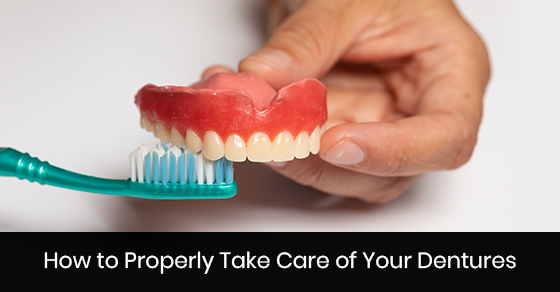
With proper care and maintenance, your dentures should last for about seven to ten years.
The resin used to fabricate dentures is a biocompatible polymer with microscopic pores where bacteria can hide. When you wear your dentures, they will become contaminated by the end of the day.
Every time you wear the dentures without cleaning them after use, you will be exposing them to more bacteria, which may lead to microbial disease that becomes a risk factor for various systemic diseases.
Denture plaque is somewhat different from dental plaque in both location and composition. Poor denture hygiene that causes denture plaque accumulation has been associated with oral infections.
The dentures may also provide a breeding ground for potentially infectious pathogens that lead to bad breath, bacterial endocarditis, gastrointestinal infection, aspiration pneumonia, and chronic obstructive pulmonary disease.
Full dentures or removable partial dentures should be cleaned every day, just like your natural teeth. Once you start wearing dentures, you should develop an oral hygiene regimen to help you control denture plaque and reduce the risk of associated oral and systemic diseases.
Cleaning your dentures will ensure that they can be worn safely and comfortably for years. This will keep them looking clean and free from unsightly stains and maintain their good fit for longer, giving you a healthy and attractive smile.
Here are some tips on how to care for your dentures:
When you remove the dentures, don’t be tempted to bend them or play with them, as you risk damaging the plastic or clasps due to improper handling.
Before removing your dentures for cleaning, always place a towel in the sink or on the counter, or put some water in the sink. These will prevent the dentures from breaking if you drop them.
Remove your dentures and rinse them after every meal by running water over them to remove food particles and other loose debris.
Similar to natural teeth, your dentures must be brushed every day to prevent permanent stains from forming. However, they should be removed from the mouth for proper cleaning. This means that the best time to clean dentures is when you remove them at the end of the day before going to bed.
Dentures are cleaned by soaking and brushing them gently with a soft-bristled brush and a nonabrasive denture cleanser or soap to remove plaque, food, and other deposits.
When brushing your dentures, don’t use a hard-bristled brush because it can wear down and damage your dentures. Also, avoid using toothpaste and other household cleaners. These are abrasive and can create tiny scratches on the dentures’ surface where food particles and plaque can build up. Never use bleach to clean dentures because it can whiten the pink part of the denture.
These are small devices that look like a small bathtub and contain a cleaning liquid. You immerse your dentures in the small bath, and then sound is used to create waves in the tub, which dislodge any deposits on the dentures. These devices should not be used as an alternative to regular brushing.
Your oral hygiene regimen should include cleaning your gums, palate, and tongue using a soft-bristled brush every morning before wearing your dentures. Be more attentive when cleaning any teeth that fit under the metal clasps of the denture. Ensure you remove any plaque that may be trapped under the clasps to reduce the risk of tooth decay. If you have a partial denture, make sure to remove it before brushing your natural teeth.
Dentures should be kept moist when not being used to prevent them from drying out or losing their shape. It’s recommended that you soak them in a denture cleaning solution or water overnight. However, this may not be suitable for dentures with metal attachments, as they could tarnish if soaked in a solution. You should also never put your dentures in hot water, as this can cause them to warp.
Rinse your dentures thoroughly before putting them back in your mouth, especially if they were soaked in a denture solution, because these cleaners may contain toxic chemicals that cause pain, burns, or even vomiting if swallowed.
Never attempt to repair or adjust dentures yourself. Dentures that don’t fit properly can be uncomfortable and cause irritation and sores on the gums. However, you should not modify or repair loose dentures yourself because you could weaken the metal structure.
Instead, contact your dentist if you encounter any problems with your dentures, including cracks, chips, or breaks, or if one of the teeth loosens. In most cases, the repairs can be done on the same day or within 24 hours.
You must continue to visit your dentist as instructed so that your mouth and dentures can be examined to assess and adjust the denture fit. They will also check for signs of oral issues, such as gum disease and oral cancer, and professionally clean your teeth. Your dentist will also notify you when it’s necessary to reline or replace the denture.
For more information about dentures, dental implants and dental bridges in Oakville, call Oakville Place Dental at (647) 496-2721 or contact us here.
 0 Comment
0 Comment